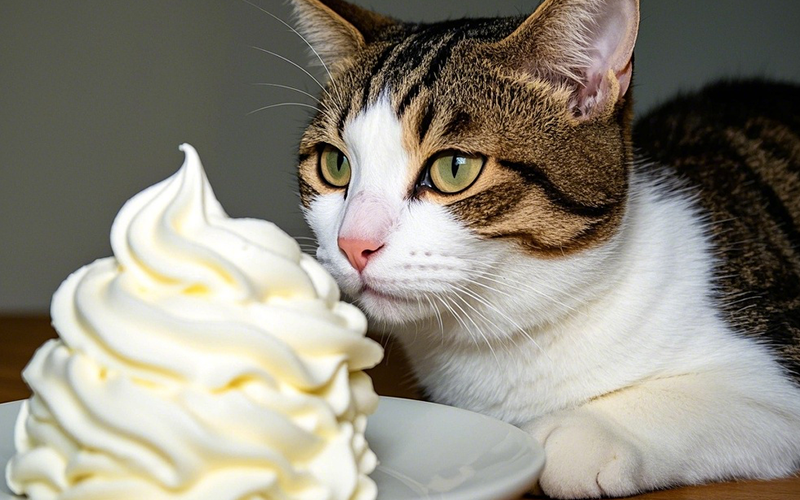Can Cats Eat Whipped Cream? A Guide to Treats for Your Feline Friend
- 31 Mar 2025 11:18
Whipped cream is a popular treat for humans, often used to top desserts, coffee, or fruit. But when it comes to your cat, you might be wondering, "Can cats eat whipped cream?" The short answer is yes, but with some important considerations. While whipped cream isn’t toxic to cats, it’s not an ideal treat for them and should be given in moderation. Here's everything you need to know about feeding whipped cream to your cat.

Are Whipped Cream and Dairy Safe for Cats?
Lactose Intolerance: Many adult cats are lactose intolerant, meaning they lack the enzyme needed to properly digest lactose, the sugar found in milk and dairy products like whipped cream. If your cat is lactose intolerant, consuming whipped cream could lead to digestive upset, including symptoms like:
Diarrhea
Vomiting
Stomach cramps or bloating
High Sugar Content: Whipped cream contains a lot of sugar, which isn’t ideal for your cat’s health. Cats don’t need sugar in their diet, and too much sugar can contribute to obesity, diabetes, and other health problems. Even if your cat doesn't experience immediate digestive issues, regular sugar consumption can lead to long-term health risks.
Fat Content: Whipped cream is also high in fat, which may not be suitable for cats, especially those that are overweight or have health conditions like pancreatitis. Excess fat in the diet can lead to digestive problems and weight gain over time.
Additives and Preservatives: Some store-bought whipped cream contains additives, stabilizers, and artificial sweeteners (like xylitol), which are harmful to cats. Xylitol, in particular, is extremely toxic to cats and can cause severe health issues like low blood sugar, seizures, and liver failure.
What Happens if Your Cat Eats Whipped Cream?
If your cat consumes a small amount of plain, unsweetened whipped cream, they might not experience immediate issues. However, eating whipped cream regularly or in large quantities could lead to:
Gastrointestinal Upset: Lactose intolerance, sugar, and fat content can all cause your cat to experience diarrhea, vomiting, or bloating.
Weight Gain: Frequent indulgence in whipped cream or other high-calorie treats could lead to obesity, especially if your cat is not very active.
Potential Toxicity: If the whipped cream contains harmful additives like xylitol or other artificial sweeteners, it could cause poisoning, which requires immediate veterinary attention.
How to Safely Offer Whipped Cream to Your Cat
If you still want to share a little whipped cream with your cat, follow these guidelines:
Limit the Quantity: Offer whipped cream only as an occasional treat and only in small amounts. It shouldn’t be a regular part of their diet.
Choose Plain, Unsweetened Whipped Cream: Make sure the whipped cream is free of any added sugar, artificial sweeteners, or harmful ingredients. Plain, unsweetened whipped cream is the safest option.
Monitor for Digestive Upset: If it’s your cat’s first time trying whipped cream, start with a very small amount and watch for any signs of digestive issues, such as diarrhea or vomiting.
Safer Alternatives for Cats
If you're looking for healthier treats for your cat, consider these safer alternatives:
Catnip: A fun, safe treat that provides entertainment and stimulation for many cats.
Cooked Meat: Small, lean pieces of cooked chicken, turkey, or fish are excellent, protein-rich treats.
Cat Grass: Specially grown grass for cats is a safe and enjoyable way for your cat to chew on something that mimics natural behavior.
High-Quality Cat Food: Stick to a balanced, protein-rich cat food to ensure your cat gets all the nutrients they need for optimal health.
Conclusion
In conclusion, whipped cream is not ideal for cats, especially due to its high sugar, fat, and lactose content. While it’s not toxic in small amounts, it’s better to avoid giving your cat whipped cream regularly. If you do decide to offer it, make sure it’s plain and given in moderation. Remember, treats should never replace a balanced, species-appropriate diet for your cat.
If you're unsure about what treats are safe for your cat or need more guidance on their diet, PettureX offers 24-hour consultations to help you make the best decisions for your cat’s health and well-being! 🐾
Related

Frankly Dangerous: Can Cats Eat Hot Dogs? Vet Explains the Serious Risks
- 16 Apr 2025
A Purrfect Protein? Can Cats Eat Ground Turkey Safely? (Vet-Reviewed Guide)
- 16 Apr 2025
Gritty Situation: Can Cats Eat Grits Safely? Vet Explains the Risks
- 16 Apr 2025
Gravy Danger Zone: Can Cats Eat Gravy Safely? (Vet-Reviewed Warning)
- 16 Apr 2025
Crunchy Query: Can Cats Eat Green Peppers? A Vet-Reviewed Safety Analysis
- 16 Apr 2025
Toxic Temptation: Can Cats Eat Grapefruit? Vet Explains the Dangers
- 16 Apr 2025
Emergency Meal or Major Mistake? Can Cats Eat Dog Food For A Couple Days? (Vet Guide)
- 16 Apr 2025
Dandelions & Felines: Can Cats Eat These Common Weeds Safely? Vet Explains
- 16 Apr 2025
Flaky Danger: Can Cats Eat Croissants Safely? Vet Explains the Buttery Risks
- 16 Apr 2025
Hazard Alert: Can Cats Eat Corn Husks? Vet Explains Dangers of This Fibrous Material
- 16 Apr 2025
